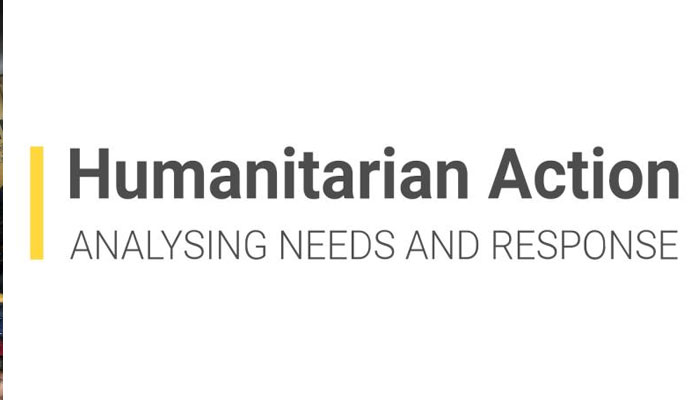POLYCRISIS: THE URGENT NEED FOR COORDINATED HUMANITARIAN ACTION IN PAKISTAN
Pakistan’s Converging Crises Pakistan is grappling with an unprecedented polycrisis a complex crisis of economic, environmental, social and political challenges that are intensifying each other. From devastating climate disasters and economic turmoil to growing food insecurity and a fragile healthcare system, these overlapping crises are deepening vulnerabilities across the country.
Traditional humanitarian interventions are no longer sufficient. The situation demands a comprehensive, coordinated response that addresses immediate needs while fostering long-term resilience.
Climate Change and Natural Disasters Pakistan ranks among the most climate-vulnerable nations, with extreme weather events affecting millions every year. The 2022 floods displaced over 33 million people, destroying homes, livelihoods and infrastructure. Droughts, heatwaves and unpredictable rainfall continue to disrupt agriculture, water availability and energy sec
urity. Without urgent climate adaptation measures, these shocks will push millions further into poverty.
Economic Crisis and Rising Inflation a worsening economic crisis, characterized by soaring inflation, currency devaluation and mounting debt, has made basic necessities unaffordable for many Pakistanis. The government’s limited fiscal space restricts social sector spending, exacerbating inequalities and reducing access to education, healthcare and essential services.
Food Insecurity and Malnutrition an estimated 37% of Pakistan’s population faces food insecurity. Climate-induced disruptions in agriculture, combined with economic instability, have led to soaring food prices and shortages. Women and children are disproportionately affected, with malnutrition rates rising alarmingly. Urgent interventions are required to promote climate-resilient farming and ensure equitable food distribution.
Healthcare and Sanitation Challenges Pakistan’s healthcare system is underfunded and overstretched. The COVID- 19 pandemic exposed critical gaps, particularly in rural areas. Waterborne diseases like cholera and dysentery remain widespread due to poor sanitation and lack of clean drinking water. Strengthening healthcare infrastructure and expanding Water, Sanitation and Hygiene (WASH) programs are vital.
Political Instability and Social Unrest Economic hardship and unequal resource distribution fuel social unrest. Political uncertainty weakens governance, making crisis response efforts less effective. Strengthening institutions, restoring public trust and fostering political stability are essential for sustainable recovery.
A Call for Coordinated Humanitarian Action:Addressing Pakistan’s polycrisis demands a comprehensive and strategic approach that integrates multiple sectors to build resilience and long-term stability. To mitigate the devastating impact of climate change and natural disasters, it is important to enhance early warning systems and strengthen disaster preparedness efforts. Investing in climate- resilient infrastructure, such as flood barriers and drought-resistant water systems, will protect vulnerable communities. Furthermore, promoting sustainable agriculture and efficient water management practices will ensure food security despite erratic weather conditions.
Economic stabilization is another key priority. Expanding microfinance initiatives and providing small-business support will empower struggling communities. Vocational training programs will equip individuals especially youth and women with the skills needed to diversify income sources. At the same time, cash assistance programs must be implemented to provide immediate relief to the most vulnerable populations.
Food security remains a pressing concern, requiring targeted interventions. The distribution of climate-resilient seeds and modern farming tools will enhance agricultural productivity. Establishing local food banks and school feeding programs will ensure access to nutritious meals, particularly for children in impoverished communities. Meanwhile, improving irrigation systems and adopting water conservation techniques will help farmers sustain their crops despite changing climate patterns.
Pakistan’s healthcare and sanitation systems must also be strengthened to prevent disease outbreaks and ensure public well-being. Mobile clinics and telemedicine services should be deployed to reach remote and underserved areas. Strengthening public health awareness campaigns will help communities prevent diseases through better hygiene and nutrition. Additionally, improving access to clean water and sanitation facilities is essential in preventing waterborne illnesses and improving overall health outcomes.
Governance and institutional capacity must be reinforced to ensure an effective crisis response. Training local leaders in crisis management will enhance coordination at the grassroots level. Encouraging public-private partnerships will mobilize resources and expertise for sustainable development. Implementing policy reforms that prioritize disaster resilience, healthcare access, and economic stability will create a more robust and responsive governance framework.
Lastly, integrating gender and inclusion perspectives into humanitarian responses is critical. Ensuring women’s participation in crisis response planning will lead to more equitable and effective solutions. Expanding gender- sensitive healthcare services, including reproductive health support and protection against gender-based violence, will address the specific needs of women and marginalized groups.
A coordinated, inclusive, and forward-thinking humanitarian approach is the only way to navigate Pakistan’s polycrisis and build a more resilient future for its people. The Path Forward Pakistan’s polycrisis demands an urgent, well-coordinated response involving government agencies, international organizations and civil society. Multi- stakeholder collaboration, data-driven decision-making and community-centered approaches will be key to navigating the current crisis while building long-term resilience.
By taking decisive action now, Pakistan can not only mitigate the immediate suffering of millions but also lay the foundation for a more resilient and sustainable future.




Comments are closed, but trackbacks and pingbacks are open.